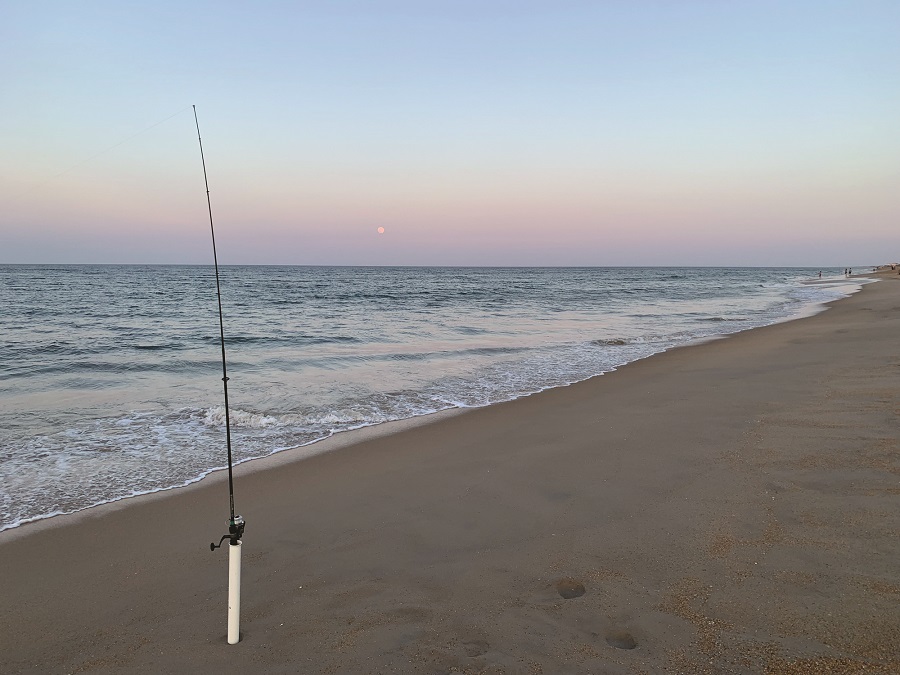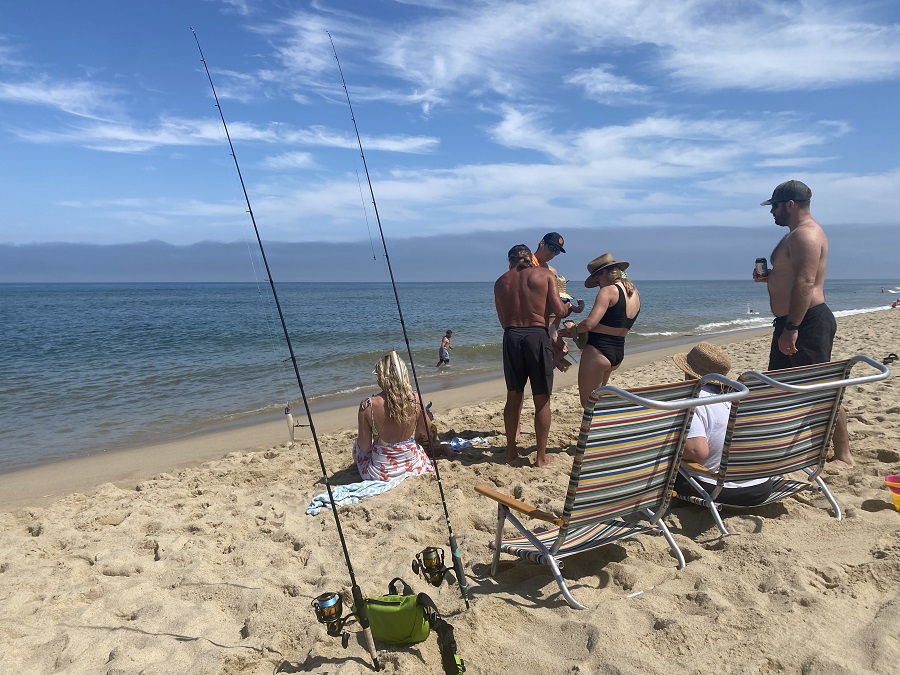On most summer days, even when there are no fishermen casting at the water’s edge, fishing rods stick up out of the sand on the back shore like so many seedlings in a newly planted forest.
This is clear evidence that, for many beach fishermen, catching a fish is secondary to other considerations. There are fish, but there are also kids and family and friends visiting. And there’s another reason why fishermen tend to be more passive fishing participants in the high summer season: parking restrictions that limit daytime fishing to just a single town’s beaches.

While the odds of there being fish on “your” beach on any given day are low, the chance of catching a fish from the beach is actually higher in July and August than during the traditional runs in late spring and early fall. After their mass migration in spring, the great schools of bass, having splintered the equally large early-season schools of baitfish, tend to break up into much smaller cadres that disperse widely along the coast. The bass cruise long distances inshore looking for pockets of prey.
Summer daytime beach fishing tip #1: Continuing to stand and cast from one spot without success is fishing’s definition of insanity. The secret to daytime fishing success is to move, move, and then move some more, trying deeper pools, rip currents, and the edges of sandbars where the sand drops into deeper water — all the while, of course, keeping an eye out for seals, birds, and the presence of bait.
The warmer months can also bring lots of bluefish to bay and backshore beaches. Bluefish, unlike stripers, are daylight feeders and have no reservations about driving bait onto the beach in the midday sun. In my pre-great-white lifeguarding days, we kept our eyes peeled for rampaging schools of bluefish that would occasionally swarm through the swimming area. Sharks were a rarity then, but bluefish weren’t, and they’re indiscriminate feeders that slash brutally through their prey with extraordinarily sharp teeth.
Summer daytime beach fishing tip #2: Follow the blues. When a bluefish blitz recedes, large bass are often present swimming right behind or under the departing blues, cleaning up the baitfish leftovers. Trade your surface popper lure for a shiny metal lure to drag beneath the blues. I’ve caught some of my biggest beach stripers that way.
Everything on Earth, living or not, is subject to one cycle or another. Like it or not, we are prisoners of Sun cycles, Moon cycles, tide cycles, weather cycles, financial cycles, political cycles — need I go on? Why should it be any different for fishing? But while you can look up fishing cycle charts based on tides and Moon phases, nowhere will you find a long-range prediction telling you to be at this beach, at this time, to catch that kind of fish.

There is another way you can increase your odds significantly, and that is simply by talking to other fishermen. Chances are high that what fish did yesterday at a certain time or tide they will repeat today and tomorrow. Information is key to discovering the latest fishing cycle, which can sometimes repeat for three or even five days if weather conditions remain constant.
This leads us, naturally, to summer daytime beach fishing tip #3: Beaches are social places. Whenever you see other surf fisherman, ask how they’re doing. Find out where and when they’ve had success recently and what lure they were using. Nine out of 10 will be happy to chat, if only to garner whatever information you might have.
Don’t be afraid to talk to the lifeguards. Guards are very much in tune with the passage of baitfish along the shores. When I was a guard, I always enjoyed the break in the monotony of staring at the water to answer a question or three.
Finally, next time you’re in the bait shop replacing line or buying a new lure, introduce yourself to the salesperson, who deals with fisherpeople hour after hour every working day. Odds are he or she is walking the beach the rest of the time, rod in hand. It’s shopkeepers’ business to improve their clients’ success, and when they recommend a particular lure, I’ve found it’s usually worth making an investment in what they’re suggesting.
It might be cheaper and easier to buy your fishing gear on Amazon. But just try asking Alexa if she knows where the fish are going to be biting today.



